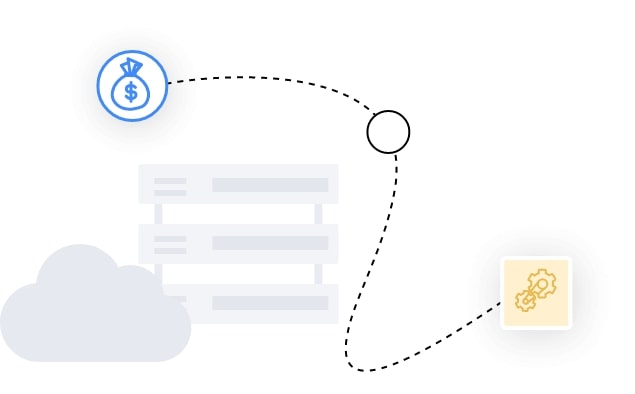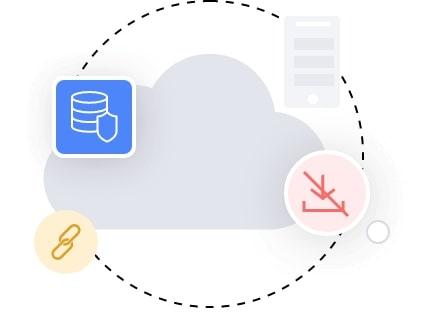
What is cloud application development?
Cloud app development is the engineering of apps for the cloud, using servers located across the globe which are hosted on the web. Internet-enabled devices, such as computers or smartphones, can access the capabilities of cloud app development platforms.
Why choose cloud app development?
Anywhere and everywhere
Your cloud apps can be accessed by you, your clients, and your users from basically anywhere—and they can be built remotely, too! All that’s required is a client, which is usually a web browser, and an internet connection.
Simplified app building
Cloud app development platforms simplify app development for you by providing the infrastructure, platform, and resources required to develop and deploy powerful apps.
Always available, always persistent
Your apps are always available and persistent, with a guaranteed uptime of 99.99%. This is because cloud app development platform providers ensure the availability and persistency of the platform on which your apps are engineered.
Security ensured
Cloud app development platforms ensure the security of your apps, as these platforms adhere to global security standards and industry regulations. Zoho has compliance certifications, such as ISO 27001, ISO 27017, ISO 27018, Soc-2 Type II, Trust-e, and GDPR.
Scale automatically
Developing apps on the cloud ensures that they scale automatically, using technology provided by the cloud app development platform. You don’t need to constantly reengineer your apps to scale with your increasing user base.
Develop once, deploy anywhere
Cloud app development platforms like Zoho Creator allow you to develop cloud native apps once, and deploy them anywhere including iOS, Android, and the web.
What’s a cloud app development platform?
Cloud app development is facilitated by platforms called cloud app development platforms, like Zoho Creator. These platforms provide servers which are accessed by clients, such as web browsers, mobile apps, thin clients, or terminal emulators.
A cloud software development platform…
Takes care of everything required to develop apps. This includes the database servers, networks, operating systems, virtual machines, storage, and firewalls.
Runs the programs required for building the apps, and stores and processes data on the client’s behalf. Also abstracts away the massive computations required for staging apps.
Advantages of cloud app development platforms

Use as you go and pay as you go
Resources supplied by the cloud app development platform are on a use-and-pay-as-you-go basis—you only pay for the resources you actually use. For example, you don’t need to buy terabytes of storage when all you actually need is a few gigabytes. The platform allocates the resources for you automatically by on-demand provisioning, and the payment is gauged according to your usage only.

Universal accessibility
The platform’s resources are always accessible, facilitating remote work and location independence for your team. You can now be truly global, harnessing the capability of minds from across the world for your organization.

Easy maintenance
Apps can be maintained much more easily by your developers on a cloud app development platform. They don’t need to individually install the application architecture on their machines because it’s remotely available on the platform’s servers.

Enhanced performance and team efficiency
Your team can synchronously make edits to your applications, as changes are reflected instantaneously through the internet. This can drastically improve your team’s performance and efficiency.
Zoho Creator: An integral cloud app development platform for all your cloud computing needs
Engineer your cloud apps on Zoho Creator today and experience cloud app development’s many benefits.
Sign up for freeFrequently Asked Questions
What are the types of cloud deployment models used for building apps?
You can deploy your apps on public, private, or hybrid clouds. The public cloud is accessible through the internet, paid for by using a subscription-based model, while the private cloud is an on-premise deployment, and the hybrid cloud is a mixture of both.
What are the main service models of cloud app development platforms?
Infrastructure as a Service (IaaS): The provider manages the infrastructure, such as the servers, networks, virtualization, and storage, for you. The infrastructure is accessed using an API or a dashboard.
Platform as a Service (PaaS): The provider gives you a platform on which you can build your apps without you having to build the infrastructure on which they run.
Software as a Service (SaaS): The software and its underlying IT infrastructure is offered as an application accessed through the internet and paid for by using a subscription-based model.
What platforms can cloud apps be deployed to when developed using a cloud app development platform like Zoho Creator?
Using Zoho Creator, you can deploy your cloud apps to the web, Android, and iOS in just a few clicks.
What is the payment model for a cloud app development platform?
Cloud app development platforms like Zoho Creator offer a monthly/yearly subscription-based pricing model, primarily depending upon the number of users and certain other factors, like records, portal users, and other features. Check out Zoho Creator's pricing here.
My organization's software is running on legacy architecture. How do I transition to the cloud? How can I benefit from cloud app development?
You can check out Zoho Creator's legacy modernization page here for further info on how to make the transition to the cloud.
